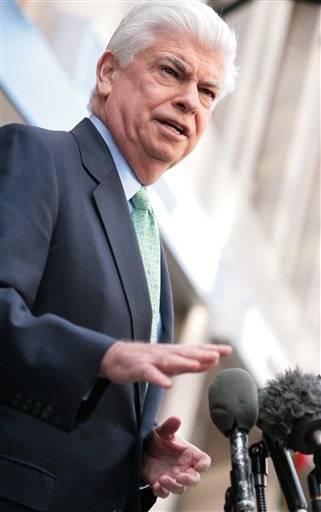White House: Auto deal is ‘very likely’

In this photo provided by CBS, Sen. Chris Dodd, D-Conn., speaks after appearing on CBS’s “Face the Nation” in Washington, Sunday, Dec. 7, 2008. (AP Photo/CBS Face the Nation, Karin Cooper)
December 8, 2008
WASHINGTON (AP) — The White House said Monday that it was “very likely” to reach a deal with Congress to help failing U.S. automakers but warned that Democratic lawmakers need to quickly provide their specific proposal.
“It sounds like we have agreement on those basic principles that would be required for a bill that the president could sign,” White House press secretary Dana Perino told reporters.
Asked if the deal could happen as early as Monday, Perino said, “I think it’s very likely.” Yet, she said that if Congress expects to hold an initial vote on Tuesday, “it seems pretty soon if we haven’t seen the language yet.”
House and Senate aides were putting the finishing touches on a proposal that would draw emergency aid from an existing loan program meant to help the automakers build fuel-efficient vehicles. The size of the package hasn’t been finalized, but it is expected to be between $14 billion and $17 billion.
It would create a presidentially named overseer charged with running a broad auto industry restructuring, with the power to require immediate payback of the emergency loans early next year if the companies fail to take the steps necessary to overhaul themselves. It could also include a Cabinet-level oversight board composed of the heads of the departments of Treasury, Energy, Labor, Commerce and Transportation and the Environmental Protection Agency. Congressional aides outlined the emerging measure on condition of anonymity because it is not yet completed.
Under the plan, the carmakers’ could get emergency loans on Dec. 15. Then the presidentially tapped overseer — a kind of “car czar” — would write guidelines, due on the first of the year, for a Big Three restructuring. If the car companies hadn’t taken enough steps to overhaul themselves by Feb. 15, 2009, the czar could recall the money. That would essentially mean that a person selected by President George W. Bush would set the terms for an auto industry restructuring, but someone picked by President-elect Barack Obama would have the power to decide whether they were being met.
The White House is pushing for a single adviser to be empowered to revoke the loans and send the companies into bankruptcy if they don’t make progress on fundamental shifts in their business. Perino didn’t rule out that the White House could support a board instead of a single person.
The White House’s main concern is that it wants to scrub the fine print of any legislative language to make sure the final deal does not weaken its main principle for a bailout: that the automakers show a detailed plan for how they will be viable in the long term. The Bush administration says it won’t support emergency help for car companies from taxpayers without such a plan.
“If they want to work with us, we’ll meet them halfway,” Perino said of lawmakers.
In return for the money, the carmakers would have to agree to terms similar to those placed on banks that receive funds under the $700 billion Wall Street bailout: to limit their top executives’ pay packages, cease paying dividends, give the government a chunk of future gains and guarantee that taxpayers would be reimbursed before any other shareholders, the aides said.
The bill under discussion would place the special investigator overseeing the bank rescue in charge of keeping tabs on the auto bailout.
Sen. Chris Dodd, D-Conn., chairman of the Banking Committee, said Sunday that General Motors Corp.’s chief executive, Rick Wagoner, “has to move on” as part of a government-run restructuring.
“I think you have got to consider new leadership,” Dodd said on CBS’ “Face the Nation.”
On Monday, Dodd said that “it’s not my job to hire and fire, but what I suggest is, you need to have new teams in place here … if you’re going to convince the American public” that the financial relief plan is necessary and justified.
Perino would not comment on the calls for specific leadership changes in the auto industry.
Dodd also said on ABC’s “Good Morning America” Monday that figures showing over a half-million people lost their jobs in November amounts to a “game-changer” in the debate over an aid package.
UAW President Ron Gettelfinger, appearing on NBC’s “Today” show, said his union is ready to go back to the bargaining table to help the auto companies, but he also said that workers should not be made “scapegoats” for their problems.
Criticized for staying on the sidelines until now, Obama voiced support Sunday for the bailout legislation being drafted in Congress. He accused car industry executives of a persistent “head-in-the sand approach” to long-festering problems.
In an appearance on NBC’s “Meet the Press,” Obama said Congress was doing “the exact right thing” in drafting legislation that “holds the auto industry’s feet to the fire” at the same time it tries to prevent its demise.
GM spokesman Steve Harris said the company appreciates Dodd’s support for the loans, but added, “GM employees, dealers, suppliers and the GM board of directors feel strongly that Rick is the right guy to lead GM through this incredibly difficult and challenging time.”
Associated Press auto writer Tom Krisher in Detroit and writer Philip Elliott in Chicago contributed to this report.






